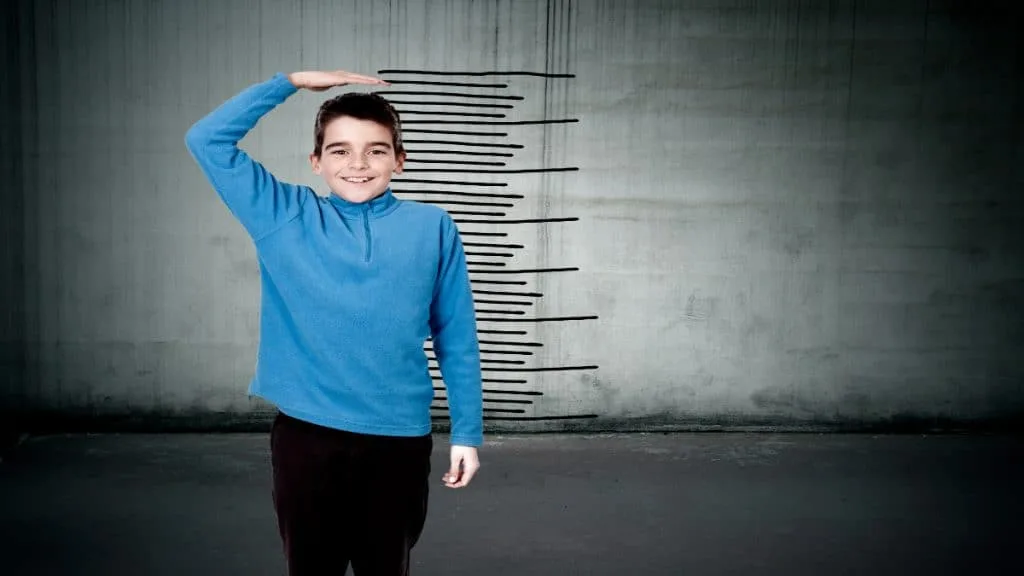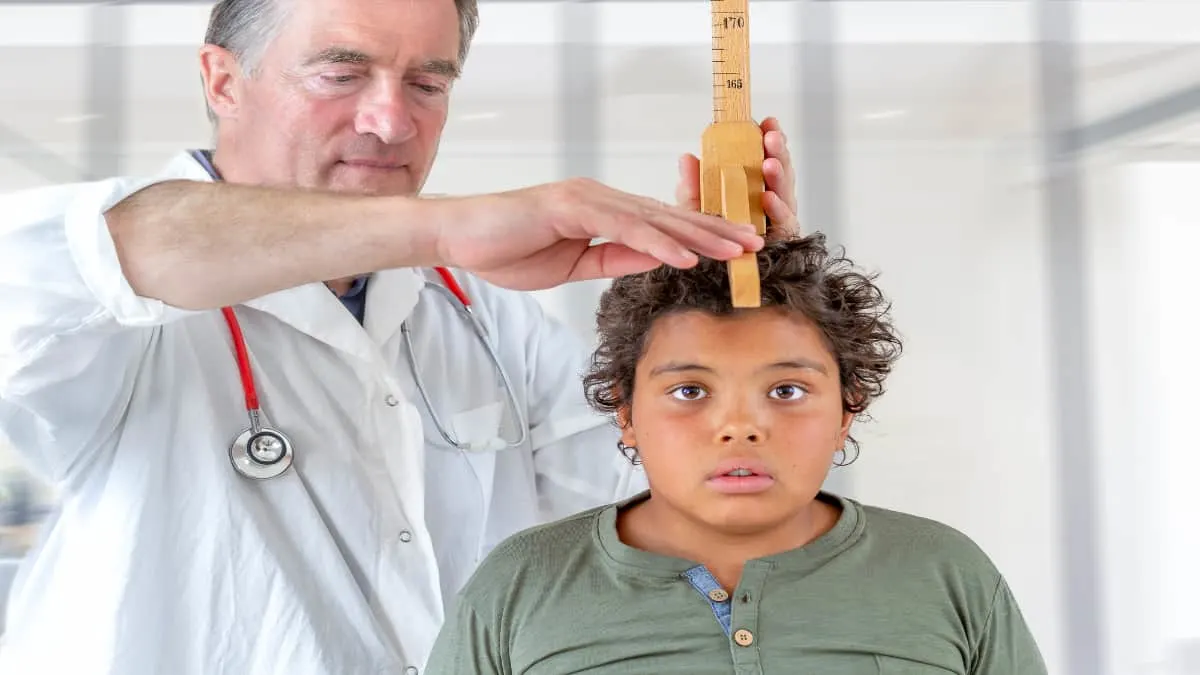If you want to learn how to grow taller at 13 as a boy or girl, then this article will provide all of the information that you’re looking for.
It’s definitely possible for most teenagers to get taller at 13. So, to maximize your height development, we’ll be discussing diet, exercise, supplements, and sleep. We won’t be leaving anything out.
Related Grow Taller Guides:
- Average height for 13 year olds
- How to get taller as a teenager
- How to grow taller at 10
- How to grow taller at 11
- How to grow taller at 12
- How to grow taller at 14
- How to grow taller at 15
- How to grow taller at 16
- How to grow taller at 17
- How to grow taller at 18
How to grow taller at 13 years old fast
If you want to find out how to get taller at 13 in a safe and effective, scientifically-proven manner, then make sure to check out these height-increasing tips.
Eat a balanced, healthy diet

Everyone talks about eating a balanced diet these days. But what does that really mean?
You essentially want to eat a diet that fulfills both your caloric and nutrient needs.
So, you can definitely eat carbohydrates for energy, such as potatoes, oats, and rice.
However, carbs aren’t typically as nutrient-dense as proteins and fats, which is why many experts recommend basing your diet on quality sources of meat, fish, and poultry.
Eggs are especially good in this regard because they contain plenty of protein and fat, and they’re also a pretty affordable food. Just make sure to eat pasture-raised eggs where possible because these eggs are richer in omega-3 fatty acids than typical eggs.
Dairy is both protein-dense and calcium-rich and is another affordable food source for those seeking an increase in height at age 13.
Eating a variety of fruits and vegetables is also incredibly important because healthy foods such as these will nourish your body and create a strong foundation for growing taller.
Avoid nutrient deficiencies

Continuing along the diet and supplement line, you should avoid nutrition deficiencies if you want to get taller at 13 years old.
If you don’t eat much red meat or shellfish, for example, then you might be deficient in zinc, which is an absolutely crucial nutrient.
Parents may wish to give their thirteen year old a quality zinc or trace mineral supplement to combat nutrient deficiencies, which do have the potential to affect your height.
Vitamin D is another important nutrient that few people get enough of. While being out in the sun is the best and most natural way to get enough vitamin D, this isn’t always possible during the winter months.
A good vitamin D supplement will promote healthy hormonal development and may even aid height development in those who are deficient. [1]
Tying this all in with the first point, eating a varied, balanced diet that doesn’t arbitrarily restrict calories or food sources will cover most of your nutrient bases. Then, optionally, a parent may wish to go the extra mile and provide their 13 year old with a trace mineral supplement.
Perform resistance training and aerobic exercise

Exercising regularly—ideally at least 60 minutes per day—is one of the main ways to get taller at 13 years old because working up a sweat releases growth hormone and strengthens your bones.
Resistance training, which you can perform with bands, dumbbells, or even just your body weight, is an excellent way to build strong bones and a healthy body. Make sure to do exercises for your legs as well as your upper body so that you can increase your bone dentistry and muscle strength everywhere.
Aerobic exercise, such as cycling, running, and swimming, is another way that a 13 year old boy or girl can improve their fitness and increase their height.
You should perform this kind of cardiovascular activity at a moderate to vigorous intensity so that you can stimulate growth hormone production and develop a healthy body that’s primed for physical growth.
Working out naturally makes you tired and is, therefore, a great way to promote a deep and restful sleep, which brings us to the next point.
Get plenty of sleep

It’s well-known that many teenagers get insufficient sleep. [2]
One can argue that school starts too early, but not every adolescent has the same sleeping pattern. [3]
And while there’s no need to go to bed as early as possible, making sure that you get plenty of sleep is a crucial aspect of growing taller at 13 years old.
A solid 8-10 hours of sleep is ideal for a 13 year old girl or boy. This might mean missing out on certain TV programs or social events, but it’s worth it if you want to get taller and be more productive at school.
Nobody who wants to increase their height should underestimate the importance of sleep, seeing as, like exercise, quality sleep promotes growth hormone production.
Don’t stress about your height

One thing’s for sure; stressing about your height won’t help you to grow any taller.
The majority of your height development is taken care of by your genetics. So besides optimizing your diet, exercise routine, and sleeping schedule, there’s not much else that you can do to get taller at 13 years old.
It’s true that many teenagers have body image issues. [4] And if you feel extremely insecure about your body, whether it be in terms of height or weight, then you should definitely talk to your parents or a trusted friend or teacher about your body image issues.
What to eat to grow taller at 13 years old

Your body needs both essential amino acids and essential fatty acids. This is why eating quality sources of protein and fat are crucial for growing taller at 13 years old.
Foods like salmon, eggs, dairy, and some red meats contain plenty of protein and fat, making them the ideal building blocks of a diet geared toward height growth.
Of course, unprocessed carbohydrates like oats, white potatoes, and sweet potatoes are versatile foods that are easy to eat and which go well with proteins and fats as part of a nutritionally balanced meal.
Eating simple, healthy snacks, such as fruit or oatmeal, is another way to add extra nutrition to your diet without making yourself too full.
What exercises are good for increasing the height of 13 year old girls and boys?

Many people recommend specific height-increasing exercises in order for boys and girls to grow taller at 13 years old.
However, exercise is beneficial for height increase because it strengthens your bones and promotes growth hormone production.
So the precise type of exercise isn’t that important. Your best bet is to find workouts or exercises that you enjoy and then stick with them.
So if you prefer swimming to cycling, then aim to get in the pool 3-4 times per week. You may hear that certain forms of exercise are better than others for increasing height, but the truth is that your body simply reacts to the physical exertion and can’t tell whether you’re swimming or cycling.
Just make sure to do a combination of resistance training and aerobic exercise for optimal health.
Is it normal to have a growth spurt at 13 years old?

Is it normal to have a growth spurt at 13 years old? Yes, statistically, it’s very normal and is, in fact, to be expected for thirteen year old boys and girls.
Between the ages of 13 and 14, a 13 year old girl can expect to grow around 2 inches, which will likely be her last significant period of height growth.
A 13 year old boy, on the other hand, will typically grow a full 3 inches in height between the ages of 13 and 14.
This is a significant period of growth for thirteen year olds, but not everyone has a growth spurt at the same time. These values are simply averages based on a specific set of data.
How to get taller at 13 years old: The verdict
Now that you know how to grow taller at 13 fast, all you need to do is put your stress aside and focus on enjoying the wonderful years that you have ahead.
We understand that many people are worried about their height, but stressing about your stature will only do more harm than good.
And while eating healthily and exercising regularly can definitely set your body up for maximum height growth (maximum based on your genetics), most of your physical development is, as mentioned, genetically determined.
References
- Ganmaa, D., Stuart, J. J., Sumberzul, N., Ninjin, B., Giovannucci, E., Kleinman, K., Holick, M. F., Willett, W. C., Frazier, L. A., & Rich-Edwards, J. W. (2017). Vitamin D supplementation and growth in urban Mongol school children: Results from two randomized clinical trials. PloS one, 12(5), e0175237. https://doi.org/10.1371/journal.pone.0175237
- Gariepy, G., Danna, S., Gobiņa, I., Rasmussen, M., Gaspar de Matos, M., Tynjälä, J., Janssen, I., Ph.D, Kalman, M., Ph.D, Villeruša, A., Husarova, D., Brooks, F., Elgar, F. J., Klavina-Makrecka, S., M.Sc, Šmigelskas, K., Gaspar, T., & Schnohr, C. (2020). How Are Adolescents Sleeping? Adolescent Sleep Patterns and Sociodemographic Differences in 24 European and North American Countries. The Journal of adolescent health : official publication of the Society for Adolescent Medicine, 66(6S), S81–S88. https://doi.org/10.1016/j.jadohealth.2020.03.013
- Lavelle, D. (2018, December 10). Kids always want to stay up late. But what’s the optimum time for them – and you – to go to bed? The Guardian. Retrieved from https://www.theguardian.com/lifeandstyle/shortcuts/2018/dec/02/kids-always-want-to-stay-up-late-but-whats-the-optimum-time-for-them-and-you-to-go-to-bed
- Holtermann, C. (2022, March 21). Does Social Media Affect Your Body Image? The New York Times. Retrieved from https://www.nytimes.com/2022/03/21/learning/does-social-media-affect-your-body-image.html

